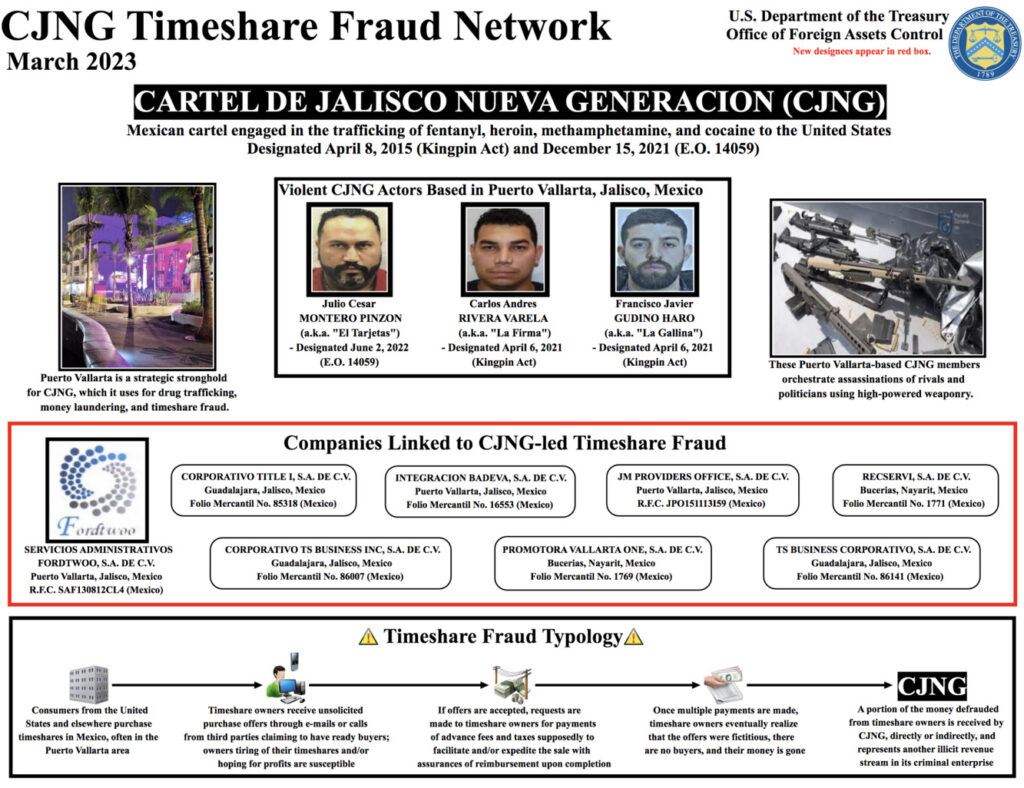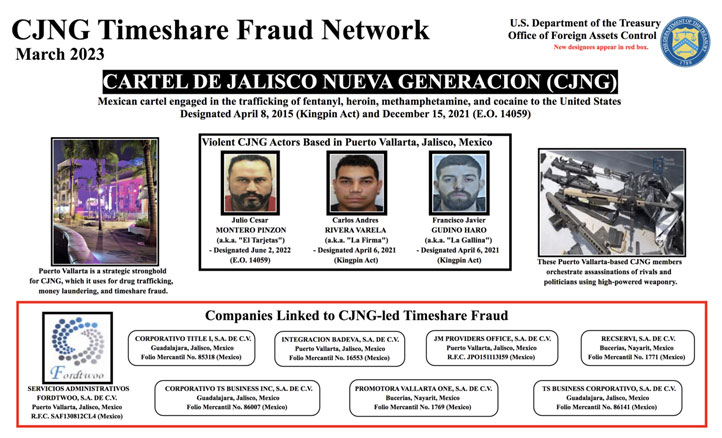Revenue from the scheme is used to finance drug trafficking.
Image Credit: U.S. Treasury Department
By Bethany Blankley [The Center Square contributor] –
The U.S. Treasury Department’s Office of Foreign Assets Control sanctioned eight Mexican companies and three members of the violent Mexican cartel, Cartel de Jaslisco Nueva Generacion (CJNG), for targeting Americans and others in a timeshare fraud scam in and near Puerto Vallarta, Jalisco, Mexico.
Scam proceeds were used to finance trafficking of fentanyl and other drugs into the U.S.

Three violent senior CJNG members were designated: Carlos Andres Rivera Varela (“La Firma”), Francisco Javier Gudino Haro (“La Gallina”) and Julio Cesar Montero Pinzon (“El Tarjetas”). They were CJNG enforcers based in Puerto Vallarta responsible for orchestrating “assassinations of rivals and politicians using high-powered weaponry,” OFAC said.
“As CJNG has consolidated territory over the past decade, it has added other crimes to its core activity of drug trafficking,” OFAC Director Andrea Gacki said. “In tourist destinations such as Puerto Vallarta, CJNG has become heavily engaged in timeshare fraud, which often targets U.S. citizens. This crime, which can defraud victims of their life savings, results in another significant revenue stream for the cartel and strengthens its overall criminal enterprise. Today’s action exposes this CJNG scheme and also serves as a warning to potential victims, many of whom are elderly.”
n 2015, OFAC first sanctioned CJNG under the Foreign Narcotics Kingpin Designation Act “for playing a significant role in international narcotics trafficking.” Since then, it’s “designated numerous CJNG-linked companies engaging in various commercial activities and multiple individuals who played critical roles in CJNG’s drug trafficking, money laundering, and corruption,” it says.

The Treasury Department made the announcement after it sanctioned several Mexican nationals, Sinaloa Cartel members and six Mexico-based entities last month for their involvement in the illicit methamphetamine and fentanyl trade.
Mexican timeshare fraud schemes often involve third-party scammers, OFAC said, where companies claim to have ready buyers and make unsolicited purchase offers to timeshare owners. If their offers are accepted, potential timeshare owners are asked to pay fees and taxes in advance to “facilitate or expedite the sale with assurances of reimbursement upon closing.” Once multiple payments are made it’s too late; timeshare owners realize the offers were fake, there were no buyers, and their money was stolen.
Eight companies OFAC designated are directly or indirectly linked to CJNG’s timeshare fraud activities, which claimed to be financial services or real estate companies. Five were in Puerto Vallerta: Servicios Administrativos Fordtwoo, S.A. de C.V., Integracion Badeva, S.A. de C.V., JM Providers Office, S.A. de C.V., Promotora Vallarta One, S.A. de C.V., and Recservi, S.A. de C.V. Servicios Administrativos Fordtwoo, S.A. de C.V. also made direct payments to CJNG members, OFAC said.
Three were in Guadalajara, Jalisco, Mexico: Corporativo Title I, S.A. de C.V., Corporativo TS Business Inc, S.A. de C.V., and TS Business Corporativo, S.A. de C.V.

Once sanctioned, all designated entities and individuals’ properties and interests in properties are blocked and must be reported to OFAC. All transactions by U.S. citizens and residents with designated entities and individuals are also prohibited.
In 2020, the Federal Bureau of Investigation and Securities and Exchange Commission issued a joint warning to Americans about Mexican timeshare scams. Anyone victimized by Mexican timeshare scams can file a complaint with the FBI’s Internet Crime Complaint Center.
OFAC also issued an alert about timeshare scams on Wednesday, warning that perpetrators were engaging in telephone, email, and letter scams falsely claiming to represent OFAC and requesting payments.

“These scammers often demand payments, occasionally described as ‘fees’ or ‘taxes,’ necessary for OFAC to release funds or pay some form of restitution,” it warned. “These communications are fraudulent and are not initiated by OFAC. OFAC does not collect, demand, or request this type of payment from members of the public.”
It warns Americans not to share any personal or confidential information with, or make any payments to, anyone purporting to represent OFAC. Scams can also be reported here.


About the Author: Bethany Blankley is a writer at the Center Square, Patheos/Hedgerow, political analyst and former press secretary at Capitol Hill / NY / WDC. Follow Bethany on Twitter @BethanyBlankley.


